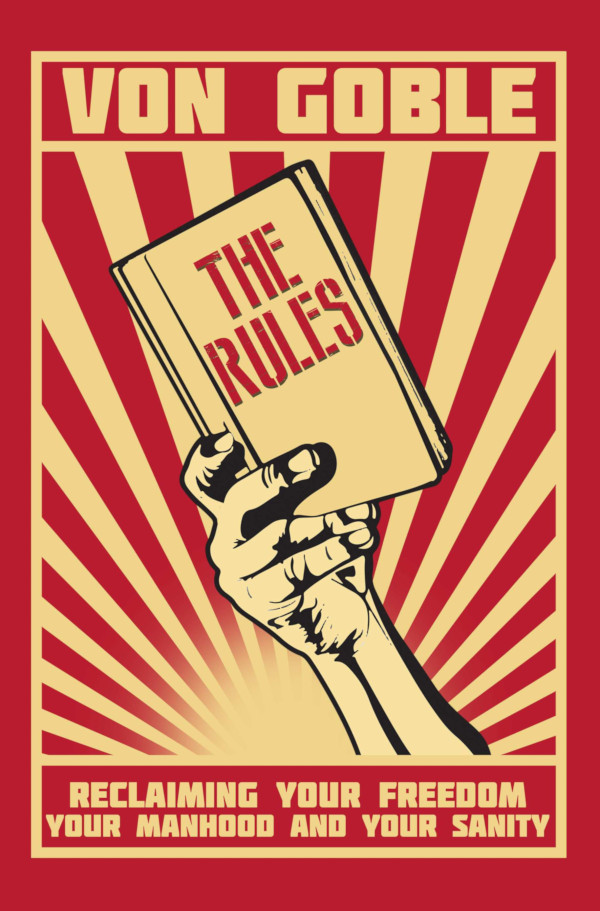The American system of statutes, regulations, executive orders, guidance documents and directives, and case law has grown too unwieldy to be applied or interpreted fairly and consistently. The problem is complex. The solution is comparatively simple.
Introduction
Every law, every regulation, every executive order, and every binding court decision is enforced by violence or the threat thereof. Any law or regulation, be it a statute prohibiting murder, rape, arson, robbery, growing grass above an approved length, or selling individual cigarettes without a license, grants the state power to use however much force is necessary (up to killing the non-compliant) to prohibit or compel an action. More than that, it invites the state into the lives of the citizens for ever more detailed investigation. Thus, the pretextual traffic stop can easily turn into detention, search, and arrest, and the missing house number can be used as an excuse to harass someone to the point of leaving a community.
The American governments (federal, state, and local) have vast powers and enormous accumulations of arms, with even the smallest law enforcement agencies having enough materiel to establish paramilitary units. And with each additional law, the demand for a more expansive mechanism of enforcement grows.
Beyond the constant threat of state violence, there is the issue of perpetual punishment. The accumulation of laws allows for almost anyone to become entrapped in a system of arrest, trial, correction, and subsequent unemployability that is no less adept at creating return clients than it is at preventing recidivism.
The Problem: Inconsistency and Impossibility
At present, the number of federal laws is unknown, with an estimate from the early 1980s putting the number somewhat above 3,000. And this does not include legally binding regulations created at the rulemaking level, which requires a public review process, but no congressional hearings or votes. Nor does it include “interpretative rules, general statements of policy, or rules of agency, organization, procedure, or practice,” which need undergo no public review process.
Estimating the number of state laws is even more difficult. The most recent (2020) print edition of West’s Annotated California Codes runs to approximately 450 books and costs slightly more than 20,000 USD. Granted, California is an outlier, with most states having shorter annotated codes, but such does not establish that understanding the laws of those states is any easier, and certainly not if those states lean more heavily on the tradition of case law than on legislative codification—with the latter being what California seems to favor. Not every law is enforced (or enforced consistently), but the authority these laws grant the hombres armados roaming our streets and collecting government salaries to interfere in the daily activities of the citizenry remains ever ready.
One cause of this overabundance of statutes is the nature of legislatures and their function. Legislative productivity—the number of substantial (non-ceremonial) laws passed by a legislature—is treated as a measure of the body’s effectiveness, with the idea being that the more laws that are passed, the better, and that legislatures (and legislators) that do not pass a great many laws should be viewed as ineffective. Admittedly, there is a straightforward logic to this. If a legislature is not passing laws, what exactly is it doing? And why should its members be compensated?
Were an uncountable number of statutes not burdensome enough, there is the equally hefty matter of state and federal appellate court judges vying for promotion by virtue of their ability to craft decisions so incomprehensible that no one dare question them. And these become part of the legal canon—meaning that we (or those of us in the relevant judicial circuit) are bound by them. The predicament of judicial writings so long as to discomfit even the most determined and sharp-eyed of legal eagles is not limited to the United States, but it is almost exclusively one of countries that rely upon the common law system—with Australia, the United States, Canada, India, and the United Kingdom taking five of the seven top spots for world’s longest written court opinions.
As it stands now, our legal system is so ungainly that not many police, few lawyers, and even fewer judges are entirely confident of what the laws they are supposed to enforce and interpret mean. Yet ignorantia juris non excusat—we are duty bound to know such a great many laws that no man or woman could ever live long enough to read them all. This is especially problematic for actions that are merely malum prohibitum—prohibited legally, but not morally wrong in the most obvious sense—rather than malum in se.
Our laws are enforced inconsistently because they must be. As bad as this is, a flawless and fair application of every statute, regulation, and court decision would be far worse. Were an impartial and perfectly reliable system of arrest and prosecution to be designed and deployed, the populace would face near-constant interaction with the legal system; the courts would collapse under dockets so substantial that the only means of repair would be to drag every barely-passed-the-bar University of American Samoa law school graduate to a courtroom and assign him/her/zher a judgeship (or to coerce nearly every defendant into a plea bargain); and the better portion of our schools would need be converted from prison-preparation centers into fully functioning penal facilities.
A capricious gang acting under color of law that (more or less) maintains order or an unprejudiced engine that throws off its flywheel and grinds to a halt brief moments after redlining—this is not so much Hobson’s choice as it is Sophie’s.
Here is the root of the problem, simply restated: There are many reasons to expand the body of rationalizations for the leviathan’s violence and almost none to contract it. Here is the best of fixes: Laws, opinions, and regulations that do not live forever.
The Solution: Implementation and Effects
Attorneys gain clients and billable hours as the legal process grows more confusing. Legislators, many of whom are also attorneys, have reason to pass laws—the need to be productive and to increase their popularity by way of getting tough on crime—but almost none to repeal them. Rulemaking divisions of the executive branch face pressures of their own. And even the members of the legislature so inclined will face either indifference from their peers or hostility from government agencies, police, or some klatch of blue-haired church ladies terrified that selling a motor vehicle on Sunday will lead one down the devil’s path (much like metal music).
Rather than expecting our legislators to fix the system by consistently acting against their rational self-interest, the simplest method of inhibiting the tumorous and deforming growth of government control is to give all laws, statutes, judicial opinions, regulatory decisions, and unofficial policy interpretation documents an expiration date. Twenty years might well be a sensible lifespan, but the exact number of years a law or interpretation thereof lives is less important than the mechanism of automatic termination. The model described in this proposal is somewhat like sunsetting, but with a greater number of mechanisms in place to make restoring a law, regulation, or policy difficult. And in a multicellular organism, apoptosis—programmed and predictable cell death—serves a similar purpose, namely that of preventing non-productive parts of the organism from consuming resources.
Legal apoptosis (LA) can be most easily effected by an amendment to the federal constitution—an amendment that could easily be made to apply to every level of government, from national laws and regulations to city ordinances. America would not inevitably enter an era of lawlessness after 20 years, but each law would need to be specifically reviewed and renewed (with no option for omnibus legislation) after going through the appropriate committee. Every federal regulation would need to complete the rulemaking process as well. Finally, all interpretations of statutes and regulations, be they at the executive level (meaning letters of clarification or executive orders) or judicial level (meaning appellate court opinions) would expire when the law or regulation upon which they are based terminates—this might well be described as derivative death or host/parasite death. In the matter of judicial opinions, they would remain binding upon the instant case but would cease to serve as published legal precedent.
Were every law currently in existence to expire at the same time, the legislatures might well be overwhelmed. Thus, LA for existing statutes could be staggered throughout the first 20-year term, with no delays or accommodations needed thereafter.
Keeping the Bastards Busy
The process described herein would be laborious. A great deal of legislative time would be dedicated to reviewing and renewing laws that are nearing their expiry. Courts would be obligated to review new statutes and interpret them afresh on an almost daily basis. Bureaucracies would be forever engaged in some part of the rulemaking process. And officials would find themselves having to rewrite memos they can but vaguely remember drafting years prior. Even law enforcement officers would need to spend a portion of their days noting what laws had been reinstated without significant modification, what laws had been changed, and what laws had been allowed to ascend to the great legal library in the sky (or descend to the great legal library of the depths, as the case may be). The workload for everyone in government would almost certainly increase, particularly during the first LA cycle, after which thousands of pages (if not more) of laws would cease to be more than ink and fibers to be pulped, if not more expeditiously used to remedy the permanent emergency of toilet paper shortages.
And that is the point!
Every law, regulation, binding policy, and city ordinance would require ongoing effort to sustain. This effort would be considerable: It would occupy so much of the government’s time that entirely new laws would only be passed infrequently and only when deemed to be worth the additional workload. Old laws—laws that were created to address an ancient crisis (real or fabricated by opportunists) would naturally pass away, as would whatever oppressive restrictions or archaic verbiage they contain. Additionally, laws that serve only to facilitate the harassment and annoyance of the citizenry would simply be allowed to reach the end of their lifespan, with few legislators willing to sponsor, time and again, laws known only for infuriating constituents and frustrating their pursuit of peace of mind and quiet enjoyment of life.
Finally, there is the matter of legal precedence and case law. Since Marbury v. Madison, the United States Supreme Court has served as much as a decider of law as of cases, with its influence and ability to effectively construct law from the bench growing more powerful over the generations. Court-ordered school desegregation, the right to an abortion (which itself extended from the Supreme-Court-developed right to privacy—a concept never explicitly considered in the Constitution), and the right to same-sex marriage—regardless of what one thinks of these rights and obligations developed by the Court, a close reading of the Constitution and relevant Court decisions should reveal that the textual foundations for them are weak (at best).
There is no reason to presume that any of these court-crafted rights and duties would need die by way of LA when the cases upon which they were established expire. Rather, they can be incorporated into the perpetually revised and modernized statutes. And those rights that people truly hold dear and believe should be woven into the fabric of the law can be further assured of permanence by way of new amendments to the federal constitution, establishing for them a degree of nearly irrevocable recognition that no Supreme Court decision can offer. And our confusion as to what means what can be lessened, when we no longer need rely upon the courts—at best, nine noble (if completely unaccountable to the public) lawyer-scholars, at worst, an assortment of assholes and cunts—to determine how language more than two centuries old should be applied in the smartphone age.
What Shall Remain and What Problems Are Likely to Arise?
In the civilian world, only the state and federal constitutions—nothing else. These, the foundational documents of the government, should endure for a longer time, although even they may need be given an expiration date of no more than a few generations. As for the armed forces, their operation is so different from that of the civilian world that the Uniform Code of Military Justice and the code of the Last Chance Corps (assuming the LCC is ever established) might well need to have longer lifespans than would ordinary statutes.
As for additional problems—the most probable is that certain legislatures may attempt to grant their laws a degree of longevity they should not be afforded by incorporating them into the state constitutions. (The federal amendment process would make doing this somewhat more difficult.) One need not speculate that this could happen, as it already has. The Constitution of the State of Alabama runs more than 300,000 words and has more than 900 amendments, making it less of a document detailing the rights of the people and the essential functions of the government, than a series of statutes—addressing everything from the elimination of boll weevils to the promotion of the catfish industry—that are structured as amendments to a governing document. The most obvious answer to this problem would be a date of expiry for amendments to state constitutions.
The last problem worth noting is that of legislatures trying to periodically revive laws that were already plainly unconstitutional (race-based voting restrictions, etc.). There is no perfect remedy for this. The reintroduction of the exact text of an already unconstitutional statute might well be forbidden by a dedicated amendment to the federal constitution, but even the dimmest of the dimwitted can figure out how to change around a word or two with the help of a thesaurus.
And this is where the courts would come into play. The courts might well need to relitigate similar constitutional issues, but this would stand to keep both appellate courts appropriately busy and disincline them from attempting to reach too far and justify their existences by pulling new rights and duties from the thinnest of judicial air.
Memento Mori
To every thing there is a season, and a time to every purpose under the heaven . . .
There is no eternal law. The Code of Hammurabi, the Law of Moses, the Draconian constitution—all these, no matter how great and wise they were for their day, are no more suited to the modern world than would be the best metalsmithing techniques of the Bronze Age. The inevitability of death—for law, for people, for conventions—serves to temper the ego, not just of the man, but of the institution. And death itself skims off the dross of fads and momentary panics. Then there is the final benefit of knowing that a cold hand shall someday tear the light and warmth of existence from the bosom of the man or thing—that of encouraging examination and reflection (of and regarding laws, regulations, or decades spent) and reminding us that our time is dearly limited.
As it is with men, so it should be with the laws of mankind.


The Rules
The Rules is a philosophy and self-inquiry text designed to help readers develop mental discipline and set life goals. It does this by way of guided readings and open-ended questions that facilitate the rational and systematic application of each Rule.
Put another way: The Rules is a book designed to help men survive and thrive in the West.
Foresight (And Other Stories)
Four tales across time and distance. Always satirical and frequently dark, this collection considers the breadth of isolation and the depth of connection.
Brant von Goble is a writer, editor, publisher, researcher, teacher, musician, juggler, and amateur radio operator.
He is the author of several books and articles of both the academic and non-academic variety. He owns and operates the book publishing company Loosey Goosey Press.








